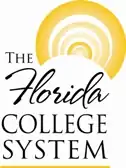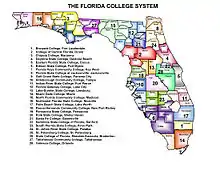Florida College System
The Florida College System, previously known as the Florida Community College System, comprises 28 public community colleges and state colleges in the U.S. state of Florida. In 2013-14, enrollment consisted of more than 813,000 students.[1] Together with the State University System of Florida, which includes Florida's 12 public four-year universities, it is part of Florida's system of public higher education.
 | |
Former names | Florida Community College System |
|---|---|
| Type | Public College System |
| Established | 1933 |
| Chancellor | Kathy Hebda |
| Students | 733,000 |
| Postgraduates | 112,000 |
| Location | 28 colleges , , |
Sporting affiliations | Florida State College Activities Association, NJCAA Region VIII |
| Website | floridacollegesystem.com www.fldoe.org/fcs |
While governed by local boards of trustees, the colleges are coordinated under the jurisdiction of Florida's State Board of Education. Administratively, the chancellor of the Florida College System is the chief executive officer of the system, reporting to the commissioner of Education who serves as the chief executive officer of Florida's public education system. In 2009, the Florida Legislature changed the name from the "Florida Community College System" to the "Florida College System," reflecting the fact that some of its member institutions now offer four-year bachelor's degrees. As of 2014, only three members of the Florida College System retain "community college" in their official name.[2]

Member institutions
Student profile
| Students[3] | Florida[4] | United States[5] | |
|---|---|---|---|
| Non-Hispanic White | 45% | 57% | 63% |
| Hispanic (of any race) |
26% | 23% | 17% |
| Black | 18% | 17% | 13% |
| Multi-ethnic | 2% | N/A | N/A |
| International student | 2% | N/A | N/A |
| Other races | 8% | N/A | N/A |
Mission and offerings
Section (s.) 1004.65, Florida Statutes (F.S.), establishes the primary mission and responsibility of Florida College System institutions as responding to community needs for post secondary academic education and career degree education. This mission and responsibility includes:[6]
- (a) Providing lower level undergraduate instruction and awarding associate degrees.
- (b) Preparing students directly for careers requiring less than baccalaureate degrees. This may include preparing for job entry, supplementing of skills and knowledge, and responding to needs in new areas of technology. Career education in a Florida College System institution shall consist of career certificates, credit courses leading to associate in science degrees and associate in applied science degrees, and other programs in fields requiring substantial academic work, background, or qualifications. A Florida College System institution may offer career education programs in fields having lesser academic or technical requirements.
- (c) Providing student development services, including assessment, student tracking, support for disabled students, advisement, counseling, financial aid, career development, and remedial and tutorial services, to ensure student success.
- (d) Promoting economic development for the state within each Florida College System institution district through the provision of special programs, including, but not limited to:
- 1. Enterprise Florida-related programs.
- 2. Technology transfer centers.
- 3. Economic development centers.
- 4. Workforce literacy programs.
- (e) Providing dual enrollment instruction.
- (f) Providing upper level instruction and awarding baccalaureate degrees as specifically authorized by law.
A separate and secondary role for Florida College System institutions includes the offering of programs in:
- (a) Community services that are not directly related to academic or occupational advancement.
- (b) Adult education services, including adult basic education, adult general education, adult secondary education, and General Educational Development test instruction.
- (c) Recreational and leisure services.
In addition, s. 1007.33(2), F.S., requires that any Florida College System institution that offers one or more baccalaureate degree programs:
- (a) Maintain as its primary mission:
- 1. Responsibility for responding to community needs for post secondary academic education and career degree education as prescribed in s. 1004.65(5), F.S.
- 2. The provision of associate degrees that provide access to a university.
- (b) Maintain an open-door admission policy for associate-level degree programs and workforce education programs.
- (c) Continue to provide outreach to underserved populations.
- (d) Continue to provide remedial education.
- (e) Comply with all provisions of the statewide articulation agreement which relate to 2-year and 4-year public degree-granting institutions as adopted by the State Board of Education pursuant to s. 1007.23, F.S.
Athletics
The schools athletic teams are governed by the Florida State College Activities Association (FSCAA) and compete in the National Junior College Athletic Association Region 8.
Chancellors and directors
| Year | Names[7] | Title |
|---|---|---|
| 1957–1967 | James L. Wattenbarger | Director of the Division of Community Colleges |
| 1967–1983 | Lee G. Henderson | Director of the Division of Community Colleges |
| 1984–1997 | Clark Maxwell, Jr. | Executive director of the Florida Community College System |
| 1998–2007 | J. David Armstrong, Jr. | Executive director of the Florida Community College System (1998-2001), chancellor of the Florida College System (2001-2007) |
| 2007–2011 | Willis N. Holcombe | Chancellor of the Florida College System |
| 2011–2014 | Randall W. Hanna | Chancellor of the Florida College System |
| 2015–2018 | Madeline M. Pumariega | President & CEO of Take Stock in Children (2013-2015), chancellor of the Florida College System (2015–2018) |
| 2019–Present | Kathy Hebda | Chancellor of the Florida College System |
Timeline
James L. Wattenbarger, distinguished service professor emeritus, University of Florida and Harry T. Albertson, former chief executive officer, Florida Association of Community Colleges, outlined the history of the Florida College System through 2009.[8]
| Timeline of the Florida College System | ||
|---|---|---|
| 1927 | St. Petersburg Junior College founded as private, two-year college | |
| 1933 | Palm Beach Junior College founded as first public college | |
| 1939 | Legislature passes law allowing counties to petition for the establishment of public colleges | |
| 1947 | "Junior colleges" detailed in report to legislature | |
| 1947-1948 | St. Petersburg Junior College becomes part of Florida's public system
Legislature approves creation of three new colleges: Palm Beach Junior College, Chipola Junior College, and Pensacola Junior College | |
| 1948 | Creation of Florida Association of Public Junior Colleges | |
| 1955 | Legislature created Community College Council to formulate long-range plans | |
| 1957-58 | Community College Council issues report to legislature which recommended state plan for 28 community/junior colleges
Legislature approves creation of six new colleges: Gulf Coast Community College, Central Florida Community College, Daytona Beach Community College, Manatee Junior College, North Florida Junior College, and St. Johns River Community College. Legislature approves statutory revisions permitting junior colleges to separate from K-12 Legislature establishes the Division of Community Colleges | |
| 1960 | Legislature approves creation of four new colleges: Brevard Community College, Broward Community College, Miami Dade Community College, and Indian River Community College | |
| 1962 | Legislature approves creation of three new colleges: Edison Community College, Lake City Community College, and Lake-Sumter Junior College | |
| 1964 | Legislature approves creation of Okaloosa-Walton Community College | |
| 1965 | Legislature approves creation of Polk Community College | |
| 1966 | Legislature approves creation of five new colleges: Florida Keys Community College, Florida Community College at Jacksonville, Santa Fe Community College, Seminole Community College, and South Florida Community College | |
| 1967 | Legislature approves creation of two new colleges: Valencia Community College and Tallahassee Community College | |
| 1968 | Legislature approves creation of Hillsborough Community College
Legislature approves measure allowing community colleges to be governed under local boards | |
| 1972 | Legislature approves creation of Pasco-Hernando Community College | |
| 1979 | Legislature creates Community College Coordinating Board | |
| 1983 | Legislature replaces Community College Coordinating Board with State Board of Community Colleges | |
| 1996 | Colleges become first state agency in Florida to embrace performance based budgeting | |
| 1998 | Commissioner of Education eliminated from cabinet position | |
| 2000 | Florida higher Education Reorganization Act restructures higher education systems and Division of Community Colleges merged with Division of Workforce Development | |
| 2001 | Senate Bill 1162 eliminates State Board of Community Colleges, creates State Board of Education, and creates local boards of trustees | |
| 2002 | New statutes give more control to local boards | |
| 2004 | Legislation outlines process for community colleges to create baccalaureate degrees and allows community colleges to change names to reflect expanding mission[9] | |
| 2009 | The Florida Community College System is renamed the Florida College System | |
| 2011 | FCS member institution Valencia College named nation's best community college as first-ever winner of Aspen Prize for Community College Excellence[10] | |
| 2012 | Governor Rick Scott announces "…$10,000 degree challenge will help us continue to improve the value of our higher education system." As of 2015, 23 of the 28 Florida College System institutions are offering $10,000 bachelor's degrees.[11] | |
| 2015 | Santa Fe College is the second Florida college to win the Aspen Prize for Community College Excellence[12] | |
| 2019 | Indian River State College [13] and Miami Dade College[14] win the Aspen Prize for Community College Excellence | |
See also
References
- Florida College System, 2014 Annual Report
- Section 1007.33, Florida Statutes, Site-Determined Baccalaureate Degree Access
- "Archived copy" (PDF). Archived from the original (PDF) on 2016-03-04. Retrieved 2016-01-09.CS1 maint: archived copy as title (link)
- "Archived copy". Archived from the original on 2012-08-14. Retrieved 2012-08-14.CS1 maint: archived copy as title (link)
- http://quickfacts.census.gov/qfd/states/00000.html
- "Section 1004.65, Florida Statutes, Florida College System institutions; governance, mission, and responsibilities".
- Wattenbarger & Albertson. "A Succinct History of the Florida Community College System" (PDF).
- Wattenbarger & Albertson. "A Succinct History of the Florida Community College System" (PDF).
- "Archived copy" (PDF). Archived from the original (PDF) on 2014-12-02. Retrieved 2014-11-24.CS1 maint: archived copy as title (link)
- Valencia College wins Aspen Prize
- Gov. Rick Scott announces $10,000 Degree Challenge
- Santa Fe College wins Aspen Prize
- Seldes, Suzanne. "Indian River State College Named Number One in the Nation by Aspen Institute". Indian River State College. Retrieved 21 February 2020.
- Riera, Gabriel. "Miami Dade College Awarded Prestigious 2019 Aspen Prize". Miami Dade College. Retrieved 21 February 2020.